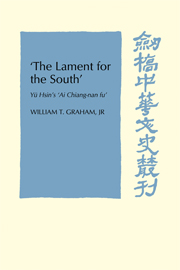Book contents
- Frontmatter
- Contents
- Dedication
- Preface
- Introduction
- 1 The historical background
- 2 The fu in the Six Dynasties
- 3 ‘The Lament for the South’
- 4 Commentary
- Appendix I Historical and biographical sources
- Appendix II Yü Hsin's career
- Appendix III Editions and commentaries
- Appendix IV The date of the ‘Lament’
- Appendix V Yü Hsin and Ssu-ma Ch'ien
- Appendix VI Two Sui shu anecdotes
- Appendix VII Genealogy
- Notes
- Bibliography
- Character glossary
- Index
Introduction
Published online by Cambridge University Press: 04 August 2010
- Frontmatter
- Contents
- Dedication
- Preface
- Introduction
- 1 The historical background
- 2 The fu in the Six Dynasties
- 3 ‘The Lament for the South’
- 4 Commentary
- Appendix I Historical and biographical sources
- Appendix II Yü Hsin's career
- Appendix III Editions and commentaries
- Appendix IV The date of the ‘Lament’
- Appendix V Yü Hsin and Ssu-ma Ch'ien
- Appendix VI Two Sui shu anecdotes
- Appendix VII Genealogy
- Notes
- Bibliography
- Character glossary
- Index
Summary
Few Chinese writers have distinguished themselves in as many genres as Yü Hsin (513–81). Yü's lyric poetry is fully equal to that of Hsieh Ling-yün (385–433), for example. His parallel-prose writings are considered models of that form, so much so, in fact, that his name has become more or less synonymous with parallel prose. Finally, Yü's fifteen surviving fu, or poems in irregular meter, include several works of the first rank, and one of them, ‘The Lament for the South’ (‘Ai Chiang-nan fu’), is probably the finest fu ever written. It is mainly with the ‘Lament’ that this book is concerned.
After a long period of neglect, there are signs of renewed interest in fu. Most of the studies have been devoted to the earlier works, but there have also been occasional forays into the Six-Dynasties period; these later fu, shorter and more accessible than the great showpieces of the Han, are likely to prove more attractive to the Western reader. Chiang Yen's (444–505) ‘Regret’, one of the best Six-Dynasties fu, is no more difficult than Su Shih's (1037–1101) ‘Red Cliff’, for example, and a student in second-year literary Chinese can read either one with ease. The same cannot be said of the works of Ssu-ma Hsiang-ju (c. 179–117 B.C.).
The ‘Lament’ is unusually long for its period, about the same length as Ssu-ma's ‘Rhapsody on the Shang-lin Hunting Park’.
- Type
- Chapter
- Information
- 'The Lament for the South'Yu Hsin's 'Ai Chiang-Nan Fu', pp. 1 - 3Publisher: Cambridge University PressPrint publication year: 1980

